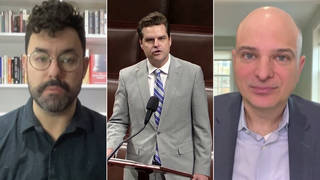
President Trump has named longtime Republican lawyer Alex Acosta to be his new nominee to head the Labor Department after his first pick, fast-food CEO Andrew Puzder, withdrew Wednesday. We look at Acosta’s record with Alan Pyke, an editor with ThinkProgress, who argues Trump’s backup choice “has skeletons in his closet, too.” Acosta has drawn scrutiny for his time as a division leader at the Department of Justice’s Civil Rights Division under President George W. Bush, where he oversaw a senior official who hired conservative lawyers who were actively opposed to the division’s mission, including the prosecution of voting rights violations and police abuse. In 2004, he played a key role in Bush’s final push to win the state of Ohio by backing Republican election officials accused of seeking to suppress voter turnout among blacks and Latinos.
Transcript
AMY GOODMAN: We turn now to President Trump’s new nominee to head the Labor Department. His first pick, fast-food CEO Andrew Puzder, withdrew on Wednesday, after massive protests for months, and it became clear that he lacked support from the key Republicans ahead of his confirmation hearing, that was supposed to be held yesterday. President Trump announced his second choice at his news conference on Thursday.
PRESIDENT DONALD TRUMP: I just wanted to begin by mentioning that the nominee for secretary of the Department of Labor will be Mr. Alex Acosta. He has a law degree from Harvard Law School, was a great student, former clerk for Justice Samuel Alito. And he has had a tremendous career.
AMY GOODMAN: Alex Acosta is a longtime Republican attorney. He served eight months as a member of the National Labor Relations Board under President George W. Bush. He’s drawn scrutiny for his time as division leader at George W. Bush’s Department of Justice’s Civil Rights Division, where he oversaw a senior official who hired conservative lawyers who actively opposed to the division’s mission, including the prosecution of voting rights violations and police abuse. In 2004, Acosta played a key role in Bush’s final push to win the state of Ohio by backing Republican election officials accused of seeking to suppress voter turnout among blacks and Latinos. Acosta is currently dean of Florida International University’s School of Law.
For more, we go to Washington, D.C., where we’re joined by ThinkProgress editor Alan Pyke. His latest article is headlined “Who is Alex Acosta?: Trump’s back-up Labor Secretary has skeletons in his closet, too.”
Welcome to Democracy Now!, Alan. What are those skeletons? Talk about Alex Acosta’s record.
ALAN PYKE: I think the fundamental problem for Acosta is likely to be his tenure at the top of the Civil Rights Division of the Department of Justice under George W. Bush. This is a man with a long record of public service, going back to the mid-1990s. But there’s this key period, from about 2003 to about 2005, during which Bush officials were intentionally sabotaging this key agency within the DOJ. This is the group that prosecutes voting rights cases, that upholds elections integrity, that conducts police oversight and enforces employment law, anti-discrimination law. Basically, every civil rights case that the federal government brings or investigates comes to the CRD.
There was a man named Bradley Schlozman, who worked underneath Acosta, who went out of his way, quite intentionally, to skew their hiring for a period of years to ensure that they would hire people he viewed as, quote-unquote, “real Americans.” And for your viewers who remember the Bush years, that was the dividing line thrown down ideologically between authentic, conservative Americans and, I don’t know, somehow fake, liberal-leaning Americans. So the Civil Rights Division was permanently sabotaged by a couple of years of intentional misconduct. And Acosta wasn’t directly involved, but he was overseeing the guy conducting that sabotage, and had every reason to know about it. And there’s an inspector general’s report from 2008 on their investigation into the scandal that holds Acosta pretty directly accountable.
AMY GOODMAN: So, talk about what happened in 2004 in Ohio. And what is Alex Acosta’s connection to that?
ALAN PYKE: So, there’s a bunch of different ways that you can try to suppress the vote, right? And one of the most popular among Republicans is a tactic called vote caging, where you generate a list of people who you suspect are Democratic voters, and you send letters to their most recent address. And if the letters aren’t returned, then you tell the Board of Elections, “This person is no longer registered at the correct address, and you should strike them from the rolls.” And then, when they show up on Election Day, they’re told they’re not registered to vote, and they can’t vote.
So the Ohio Republican Party attempted to cage—I think it’s something like 25,000 or 35,000 primarily black voters in the state of Ohio in the closing weeks of the 2004 election. And it ended up in court, as these things usually do. It was not a court case that involved the federal government. The DOJ was not involved. Alex Acosta had not been asked by the judge to weigh in in any way. But he nonetheless sent a letter, personally, to the judge in the case four days before Election Day, urging him to accept the Republican counsel’s logic and to uphold their voter suppression scheme. So, it’s regarded by career attorneys in the Civil Rights Division as a wildly inappropriate use of his office. One of them, one of his colleagues at the time, called it outrageous, in press reports, about what happened.
And that 2004 letter has dogged him throughout his subsequent career. At one point, he—in 2014, he was a finalist to become the dean of the University of Florida’s law school, which would be a sort of a promotion from his current gig at FIU Law. And he was removed from the finalist pool in part because law faculty at the University of Florida strenuously objected to his application, to his candidacy. And one of the things they pointed to was that 2004 letter.
AMY GOODMAN: Can you talk about what this nomination means for the Department of Labor?
ALAN PYKE: Sure. I think there’s some poetry here, in the sense that the last—the outgoing secretary of labor, Tom Perez, was also a career lawyer and a career public servant. And when he came in at the Civil Rights Division, which was his first job under President Obama, he had to clean up the mess that Alex Acosta and Bradley Schlozman and George W. Bush had made of the Civil Rights Division. There are a couple of famous moments from 2009 and 2010 where Perez and Holder had to sort of go to the Civil Rights Division staff and tell them, “Look, you’re open for business again. This is once again an agency of the federal government that’s going to do its job.” That’s how dark and how deep the damage was from the Bush years. And now we’ve got another career attorney coming in to run the Department of Labor, sort of in the reverse pattern of Perez’s own career arc within the Obama administration.
And I think it’s noteworthy that there is such a contrast between Andy Puzder, Donald Trump’s original nominee, fast-food CEO with a sort of brash outward demeanor and a negative reputation, and lots of
oppo research kept coming out and coming out and coming out. Puzder sort of fits the Trump brand. Alex Acosta is a much more sort of buttoned-up, professional type of guy. His reputation is for a highly competent management. He’s got a decade, two decades of public service behind him. And if you’re a progressive or a liberal or a Democrat, that’s probably almost more worrying than the idea of Andy Puzder running the Department of Labor, because Acosta’s record is somewhat—is as someone who can very competently execute the agenda of his boss inside of a complex federal bureaucracy. So, if you want to find somebody who can sabotage a federal agency and turn it against its whole purpose, Alex Acosta’s résumé is glimmering. It’s exactly who you want if you’re out to sabotage the Department of Labor.
AMY GOODMAN: Well, Alan Pyke, I want to thank you for being with us, editor with ThinkProgress. His latest article, “Who is Alex Acosta?: Trump’s back-up Labor Secretary has skeletons in his closet, too.”













Media Options